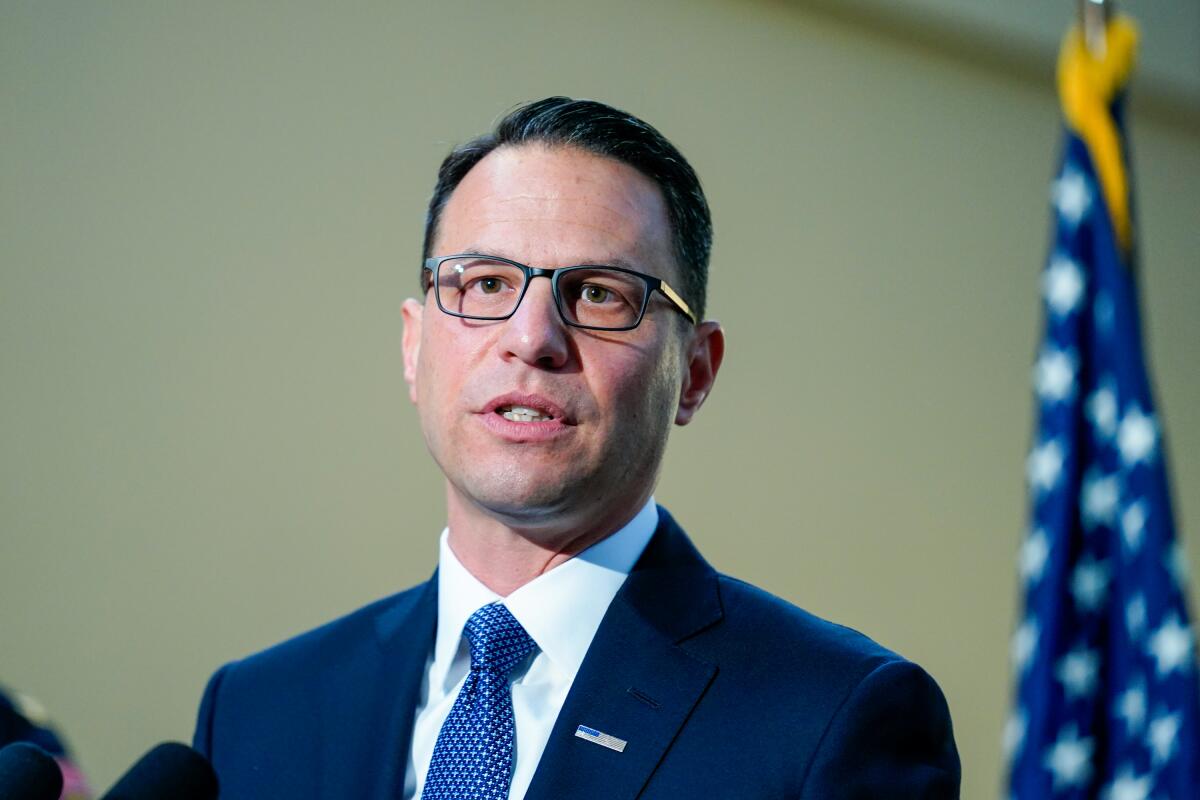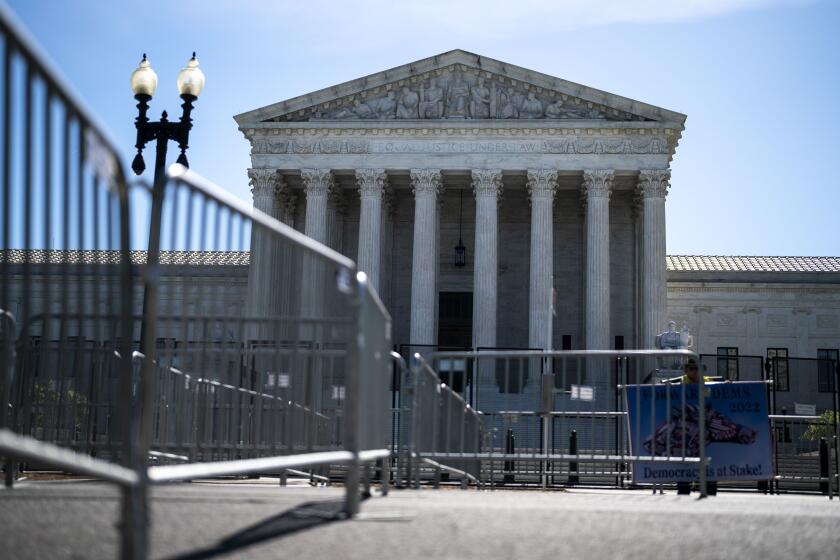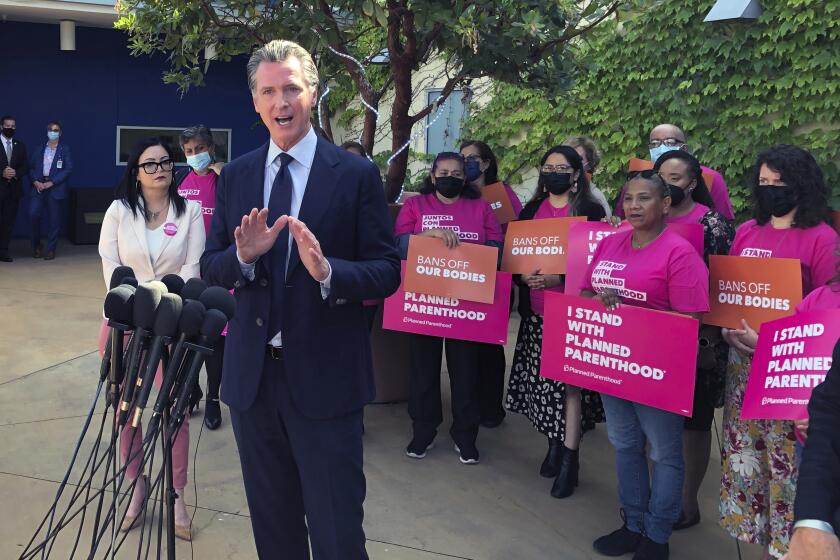Pennsylvania governor’s race could have outsize impact on abortion access

- Share via
One day after the draft Supreme Court decision that would overturn Roe vs. Wade leaked, Pennsylvania Democrat Josh Shapiro declared that his bid to become governor was the only thing preventing Republicans from restricting abortion access in the state.
“The next governor is going to have a bill on their desk that will restrict or outlaw abortion rights, and they will have a decision as to whether to sign it or veto it,” he told reporters this month. “I will, of course, veto it. My opponents would sign it.”
For the record:
4:45 p.m. May 20, 2022A previous version of this article misidentified a Kansas group seeking to pass an amendment to the state’s Constitution as Kansas Family Votes. It is Kansas Family Voice.
If the landmark 1973 Roe vs. Wade decision guaranteeing protection of abortion rights is overturned, abortion policy will be set by states, where Republicans hold the majority of legislatures and governorships. But in a handful of states, particularly Pennsylvania and Kansas, the winner of the November gubernatorial races could have a significant impact, vetoing or signing into law abortion legislation that would affect millions of people of reproductive age both in their jurisdictions and in nearby states.
A look at three common beliefs about the justices’ expected ruling on Roe vs. Wade.
Across the country, Democrats running for governor are hoping the possibility of Roe vs. Wade being overturned will drive concerned voters to turn out in competitive races. Even in states where Democrats would have a difficult time barring abortion restrictions passed this year or earlier, candidates have promised to block new bills.
Meanwhile, Republican gubernatorial candidates have also sought to make abortion an issue in their races, aiming to paint themselves as the GOP contender most opposed to abortion in those primaries.
And in deep-blue California, Gov. Gavin Newsom has deployed campaign ads in his reelection bid noting that a Republican opponent “wants to roll back abortion rights,” messaging he also used in successfully fending off a GOP-led attempt to recall him from office last year.
“Governors in many states will truly be the backstop, protecting access to abortion as Roe’s power is reduced,” said Jenny Lawson, executive director of the super PAC Planned Parenthood Votes.
Planned Parenthood Action Fund, NARAL Pro-Choice America and Emily’s List announced this month that they plan to spend a combined $150 million on messaging and communication to promote candidates who support abortion rights, including in gubernatorial races.
Lawson said they are focused on protecting incumbent Democratic governors in Kansas, Michigan, Wisconsin, Minnesota and Nevada, flipping Republican-held seats in Georgia and Arizona, and helping Shapiro win in Pennsylvania.
Of the seven states with toss-up governor’s races, four have Democratic governors and Republican legislatures: Pennsylvania, Kansas, Michigan and Wisconsin.
Michigan and Wisconsin have pre-Roe laws on the books banning abortion that could be reinstated. The Democratic governors there, Gretchen Whitmer and Tony Evers, respectively, have opposed those bans.
In Pennsylvania, where abortion is legal up to the 24th week of pregnancy, term-limited Democratic Gov. Tom Wolf has vetoed several bills that would have restricted abortion access. One of those bills, a six-week ban that would effectively block the majority of abortions, was introduced in the state Senate by Doug Mastriano, a candidate endorsed by former President Trump who is leading the field heading into Tuesday’s Republican gubernatorial primary.
In Kansas, a 2019 state Supreme Court decision found that the state Constitution included a right to abortion. That decision has blocked the Republican-controlled Legislature from passing laws to reduce abortion access, and would continue to allow abortions in Kansas even without a federal right. A proposal to strip the right from the state Constitution, called the “Value Them Both” amendment by supporters, has been placed on the August primary ballot.
If the amendment passes, the state Legislature would be able to approve new abortion regulations. Republicans would be able to override a veto from Democratic Gov. Laura Kelly if they maintain their supermajorities in both chambers.
“We are laser-focused on Aug. 2,” said Brittany Jones, director of policy and engagement for Kansas Family Voice, part of the coalition behind the amendment. “We believe that Kansans do not want to be a destination for abortion. We’re expecting a hard-fought campaign, but we’re up for the challenge.”
Nearly half of the 7,849 abortions performed in Kansas in 2021 were for out-of-state residents, mainly from Missouri, according to the Kansas Department of Health. Without Roe, new abortion restrictions in nearby states including Oklahoma, Missouri and Nebraska would likely lead more people to visit Kansas to terminate pregnancies.
Pennsylvania could also see an increase in out-of-state residents from Ohio and West Virginia seeking abortions.
Shapiro, who is running in a swing state, and Kelly, who is campaigning in a red state, have approached abortion in different ways.
Kelly “hasn’t really brought it up, but there isn’t a need for her to bring it up,” said Christopher Reeves, a Democratic strategist based in Kansas. “While it is not an immediate issue right now, as the summer goes on it” will become the primary issue in the race, he said.
Kelly reaffirmed her support for abortion rights after the draft decision leaked, but has not portrayed her election as a battle over abortion rights in the same way Shapiro has ahead of the amendment vote. Her likely Republican opponent, Kansas Atty. Gen. Derek Schmidt, has backed the amendment.
In Pennsylvania, Shapiro released an ad tying Mastriano to Trump and claiming he wants to “outlaw abortion.” Mastriano has said abortion is the No. 1 issue of his campaign.
On Saturday, the former president endorsed Mastriano, who was among those who attempted to overturn President Biden’s Pennsylvania win and the results of the 2020 election.
The question for Shapiro, Kelly and other gubernatorial candidates employing similar strategies is whether anger on the left over Roe will lead to more Democratic votes in November.
The subsidies are included in a $125-million abortion services plan Newsom will send to legislators on Friday as part of his revised state budget.
Robert Blizzard, a GOP pollster, said he isn’t convinced the leaked decision is having that big of an effect on elections, especially at the national level.
“Things can change, things can shift. But that’s, I think, where we are today,” he said. “Most polling that we’ve seen, privately as well as publicly, furthers that point, that it’s not swaying people to vote differently. It’s not swaying enthusiasm or interest level on either side.”
At the state level, Democrats’ ability to make abortion a central issue will vary. In Kansas, where Blizzard worked on Kansas Republican Roger Marshall’s successful Senate campaign in 2020, Marshall won on an antiabortion platform.
And in Pennsylvania, a swing state where the Democrats’ biggest problem is enthusiasm, the race may focus less on policy and more on the personality and character of the candidates if Mastriano wins Tuesday’s primary, Blizzard said.
Mastriano has become a controversial figure within his own party — Republicans launched an 11th-hour bid to coalesce around former Pennsylvania Rep. Lou Barletta, out of fears Mastriano is too conservative for the general election. That plan hit a snag when Trump endorsed Mastriano, praising him for his opposition to the 2020 election results.
With six days until Pennsylvania’s primary, Republicans are openly worrying that a leading candidate in the crowded GOP field running for governor is unelectable in the fall general election.
“This is going to be a good test, if some of these candidates make their way through the primary, to see not how big the wave is, but maybe how deep it is,” Blizzard said. “Does it even bring in people who would, in previous years, be more challenging for a general election audience?”
The 2022 midterm cycle seems poised to be a wave year for Republicans, who are banking on voters’ concerns over inflation, gas prices and the cost of groceries to help earn them votes. Democrats say voters on both sides of the abortion debate recognize the importance of the coming elections.
In Pennsylvania, it will all come down to the governor’s race.
“The chance of us winning back either chamber [of the state Legislature] in this coming election is almost nil,” said Ed Rendell, a former Democratic governor of Pennsylvania who also served as chair of the Democratic National Committee. “The governor’s election will be Armageddon.”
In past cycles, abortion has been one of several issues to take root in close primaries and general elections, but has not always been a deciding factor. In 2002, Rendell beat Bob Casey, then state auditor general, in the Democratic primary for governor. Abortion rights groups backed Rendell, who supported their cause, over Casey, who did not.
Rendell, however, credited his win to a host of other issues.
“Because there was no fear that Roe vs. Wade would go away, it was not an issue that most voters voted on,” he said. “This time around, people are going to be fanatical.”
More to Read
Get the L.A. Times Politics newsletter
Deeply reported insights into legislation, politics and policy from Sacramento, Washington and beyond. In your inbox twice per week.
You may occasionally receive promotional content from the Los Angeles Times.














